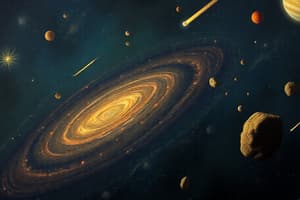Podcast
Questions and Answers
What is the average time interval between large asteroid impacts on Earth?
What is the average time interval between large asteroid impacts on Earth?
130,000 years.
Describe the shape of most asteroids in the Solar System.
Describe the shape of most asteroids in the Solar System.
They are usually irregular and are often compared to the shape of potatoes.
What is the largest asteroid, and what year was it discovered?
What is the largest asteroid, and what year was it discovered?
Ceres, discovered in 1801.
What happens to small asteroids when they enter Earth's atmosphere?
What happens to small asteroids when they enter Earth's atmosphere?
What is the composition of the asteroid Itokawa as studied by scientists?
What is the composition of the asteroid Itokawa as studied by scientists?
How does the force of gravity affect the structure of small asteroids?
How does the force of gravity affect the structure of small asteroids?
Where in the Solar System is the asteroid belt located?
Where in the Solar System is the asteroid belt located?
What are tidal forces, and how do they affect asteroids like Itokawa?
What are tidal forces, and how do they affect asteroids like Itokawa?
Flashcards
What are asteroids?
What are asteroids?
Rocky objects that orbit the Sun, with sizes ranging from meters to hundreds of kilometers. Most asteroids are irregularly shaped, resembling potatoes.
Describe Ceres.
Describe Ceres.
The largest asteroid, discovered in 1801, initially thought to be a planet. Rounded with craters, it has a core, mantle, and crust, resembling a small planet.
What is asteroid Itokawa?
What is asteroid Itokawa?
One of the smallest asteroids visited by a spacecraft, about 530 meters long and 250 meters wide. Itokawa is composed of lumps of rock, likely fragments from other celestial bodies due to impacts.
How are single-piece asteroids identified?
How are single-piece asteroids identified?
Signup and view all the flashcards
How often do asteroids impact Earth?
How often do asteroids impact Earth?
Signup and view all the flashcards
What are the reasons behind asteroid impacts?
What are the reasons behind asteroid impacts?
Signup and view all the flashcards
What is the asteroid belt?
What is the asteroid belt?
Signup and view all the flashcards
What are tidal forces?
What are tidal forces?
Signup and view all the flashcards
Study Notes
Asteroids
- Asteroids are rocky objects orbiting the Sun.
- Sizes range from a few meters to 975 km in diameter.
- Shapes are irregular, often described as potato-like.
- Most reside in the asteroid belt, between Mars and Jupiter.
- Millions exist, some named and studied.
- Ceres, discovered in 1801, was initially mistaken for a planet, leading to the term "asteroid." It has a diameter of 975 km.
- Ceres resembles a small planet with a round shape, craters and layers like a planet (core, mantle, crust).
- Itokawa, a relatively small asteroid (530m long, 250m wide), is made up of lumps of rock likely broken off from other celestial bodies.
- Itokawa's gravity is weak, and it can be distorted by tidal forces from larger objects (like planets).
- Small asteroids, spinning quickly, are often a single rock.
Asteroid Impacts on Earth
- Large asteroid impacts on Earth occur roughly every 130,000 years.
- Smaller impacts are much more frequent.
- Asteroid impacts are influenced by a combination of Earth's gravitational pull and the proximity of asteroid orbits.
- Many smaller asteroids burn up in the atmosphere.
- A map shows impacts between 1994 and 2013.
Studying That Suits You
Use AI to generate personalized quizzes and flashcards to suit your learning preferences.
Description
Explore the fascinating world of asteroids, their characteristics, and their potential impacts on Earth. Learn about various asteroids, including Ceres and Itokawa, along with the frequency and effects of asteroid collisions with our planet. This quiz will test your knowledge on both the nature of asteroids and their cosmic significance.




